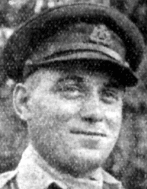 The son of Elisheva and Michael, Simcha Wilnitz was born on March 30th 1918 in a Jewish quarter of London. In his youth, he received a religious-national education and acquired a higher education. As he grew up he developed a high regard for Eretz Yisrael.
The son of Elisheva and Michael, Simcha Wilnitz was born on March 30th 1918 in a Jewish quarter of London. In his youth, he received a religious-national education and acquired a higher education. As he grew up he developed a high regard for Eretz Yisrael.
In 1940 he was recruited into the British Army and served as an aide to Orde Charles Wingate, a friend of Israel, in the jungles of Burma and in the battlefronts of Japanese forces. (¹He was a Chindit and operated behind the Japanese lines, and had first-hand knowledge of guerrilla warfare and surprise tactics.) He reached the rank of major. As a British soldier he preserved his Judaism with pride. With the founding of the Jewish Brigade he requested a transfer, saying, “It is better to be amongst my people.” On his return to England he felt discomfort and disquiet, and relayed to youth and adults his enthusiasm about Zionism and building a Jewish state.
After his release from the British Army, he made aliyah to Israel in January 1947 as a spice merchant, thus bypassing the British restrictions on aliyah.
At the outbreak of the War of Independence, he left his work in a bank and joined the army. After a short period of active service he became a liaison officer with the United Nations Observer Force, representing the interests of the Jewish soldiers with pride. He had a keen eye, an attentive ear, and a brain which was alert to everything that was happening around him. He was not afraid of danger and carried out his duties with dedication and loyalty.
Major Simcha Wilnitz fell on March 2nd 1949 when his vehicle hit a mine in the region of the Plugot junction.
He was laid to rest at the military cemetery in Nachlat Yitzhak.
¹ Excerpt from an article appearing in the Ha’aretz newspaper in 1949:
Those who knew him in London, in the jungles of Burma, in the Jewish Brigade, and later in the Israel Defense Forces, held him in high esteem as an outstanding man, straightforward and without conceit, and devoted to his parents who had remained in the Diaspora.
He had no relatives in Israel to walk behind his coffin, but many friends who loved him accompanied him on his last journey.
Sources: Translated from the Yizkor Web site
¹ Ha’aretz newspaper article, 1949

